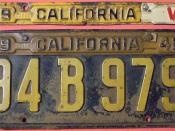A beautiful day in your Berkeley, California community and you're out running errands. The sun is shining softly while a faint breeze keeps the heat from becoming even remotely noticeable, creating the kind of perfectly balanced weather you've only read about in a "Come to California" brochure. Walking out of the post office, a peculiar sign catches your eye. Your heart breaks. The world as you know it is forever changed by the print you read. You rush home and begin packing all of your family's belongings.
This is the beginning of Julie Otsuka's novel When The Emperor Was Divine. Set in 1942, just as the Second World War was coming to its peak, When The Emperor Was Divine examines the complications, atrocities, and humanity involved in this particular section of time in the world. The book revolves around a family, referred to only as woman, daughter, and son, during their time of imprisonment in an internment camp outside of Topaz, Utah.
The father character had been taken before the rest of the family, making for an interesting look at the way individual's deal with both losing a loved one and reuniting with them. The ultimate effects of war, family displacement, and how children develop in accordance to their surroundings are just some of the themes woven throughout the details of the novel, however, the most important realization any human should come away with after exploring this novel is that of the treatment of Japanese Americans during World War II. The significance of the title can be analyzed in several ways. Its main symbolic allusion being to that of the "empirical" connotations associated to internment camps by those thousands of interned and the "divinity" that ruled over them. The captives could not say the real emperor's name because the...


